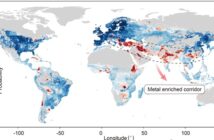A new study published by a team of international scientists across five continents led by KAUST (King Abdullah University of Science and Technology) associate professor Brande Wulff reports a previously unknown molecular event that initiates the immune response to a major wheat disease. The findings provide strategies to engineer wheat that have stronger immunity against infection.
“Climate change is causing diseases to appear in places previously unseen. We need more study of plant immunity to develop technologies that will protect valuable food crops,” Prof Brande.
The study shows the first molecular events to occur inside plant cells in response to stem rust. The immune reaction begins when stem rust interacts with a specific type of protein known as ‘tandem kinases’. Kinases are universal molecules that operate in human immunology too, as well as contribute to glucose uptake, the formation of blood vessels, neural development and more. Tandem kinases get their names because they are physically linked together. They are also known for their role in plant immunity.
While their importance in stem rust immunity does not come as a surprise, the study shows the initial molecular reactions tandem kinases conduct to achieve an immune response. This response ultimately kills the cell, denying the pathogen of the nutrients it parasitically extracts. Thus, the pathogen fails to proliferate and infect more cells, instead dying with its morbid host.
In the absence of the pathogen, Wulff and his colleagues found that the tandem kinases are bound to each other, almost like wearing handcuffs, keeping them inactive. However, when a pathogen binds to one of the kinases, it effectively unlocks the cuffs, freeing the other kinase to switch on the immune response. This mechanism had never been previously observed and gives insights on ways to engineer wheat that have stronger resistance against threatening disease.
Because of the evolutionary conservation of the immune mechanism across cereals and against other pathogens, the study provides a framework for strengthening cereal crops against many diseases.
“A majority of countries see wheat as critical to their food policy and food security. The more we understand how wheat reacts to pathogens, the more we can sustainably secure the food supply for the world’s growing population,” noted Prof Wulff.




